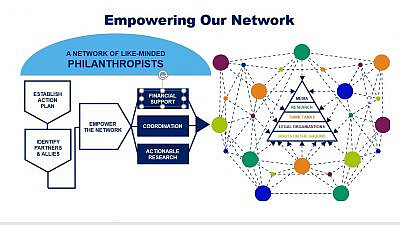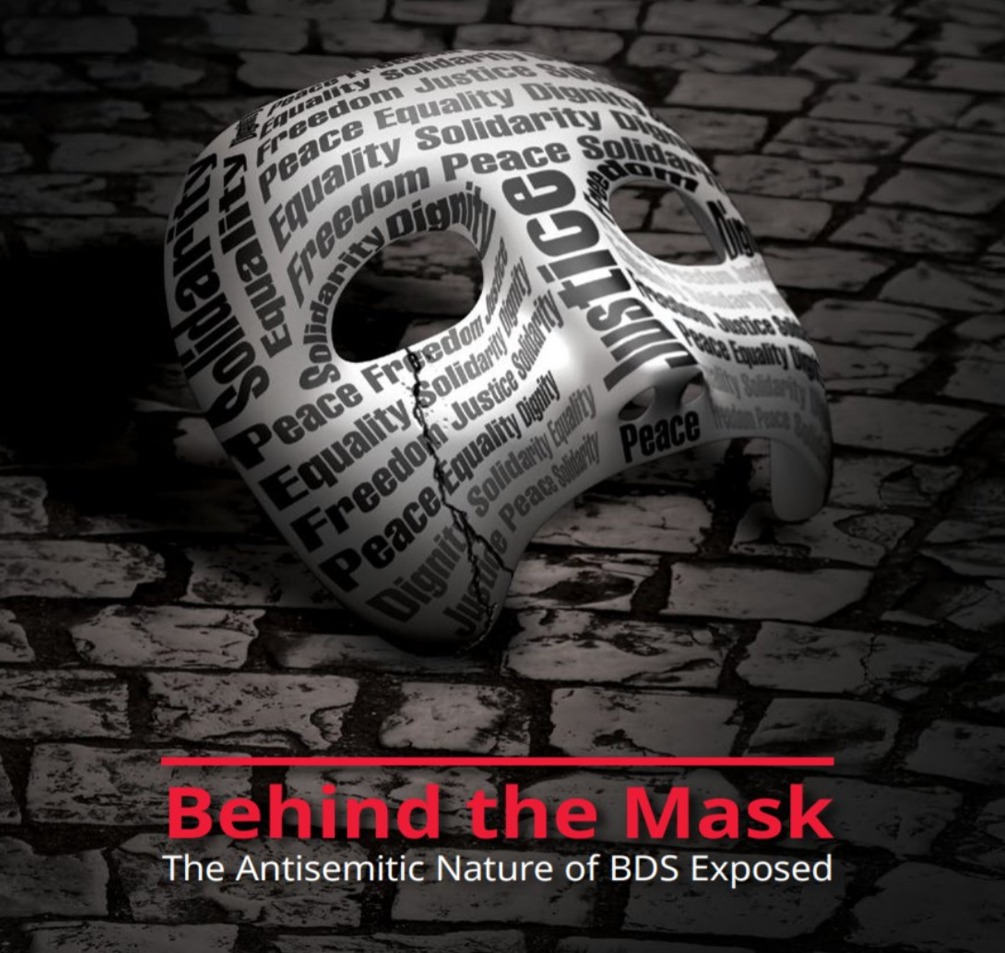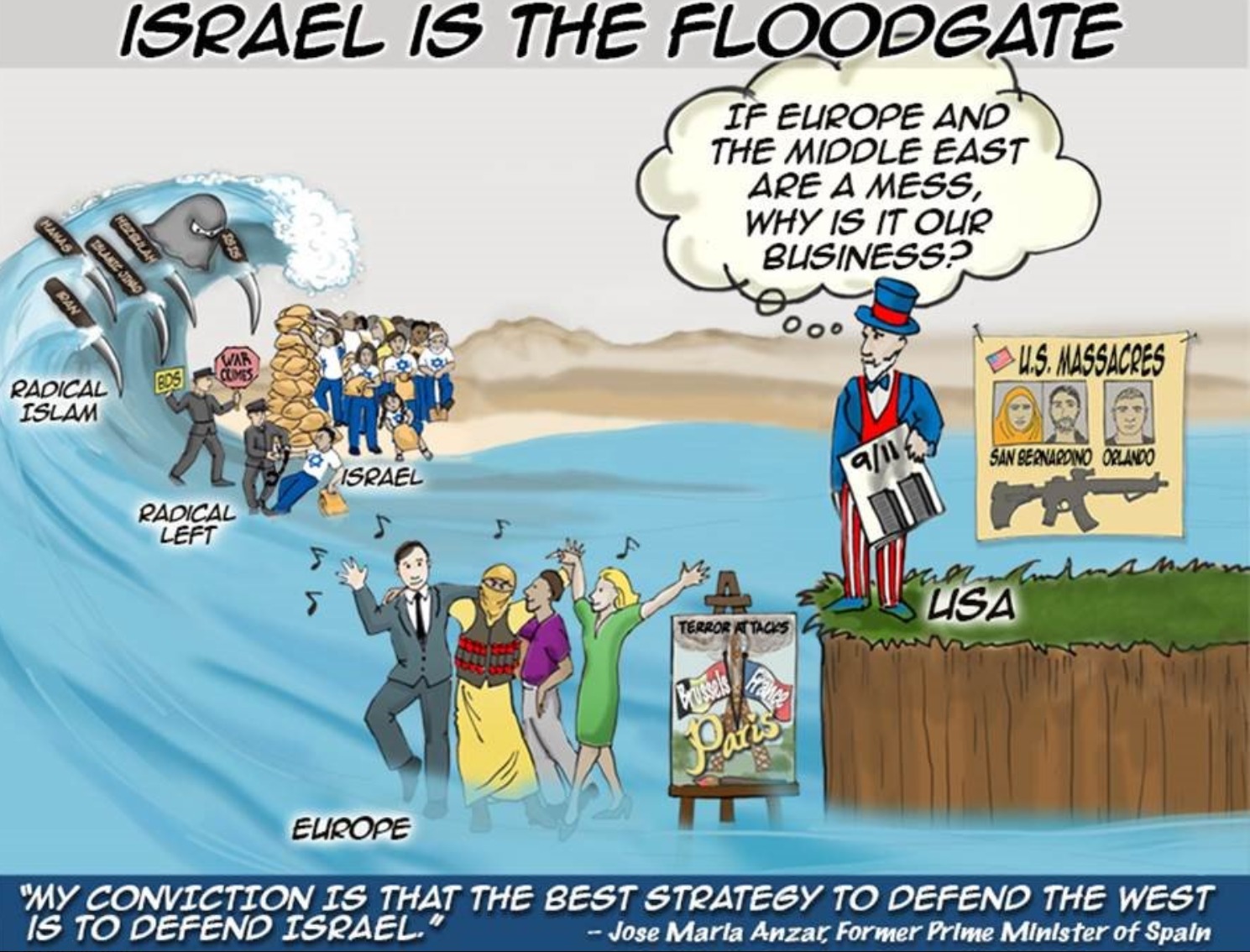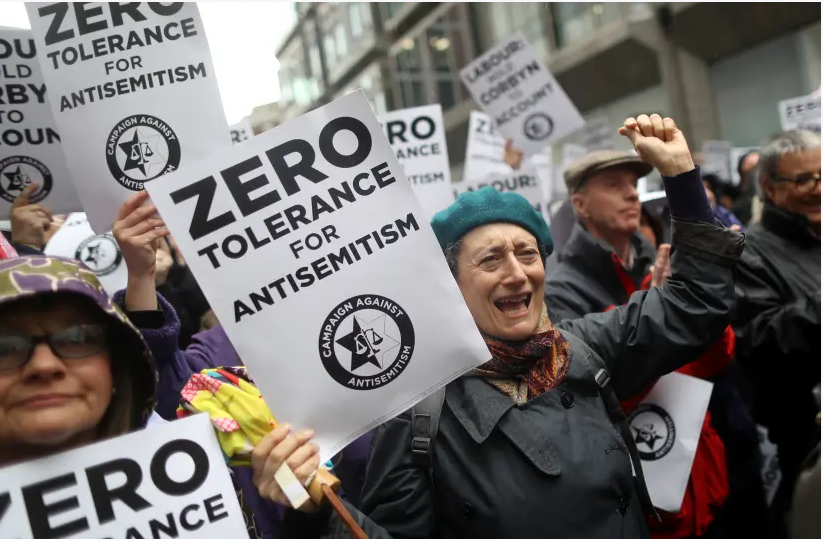This article was originally published in the Jerusalem Post on December 26, 2021, written by Adam Milstein of the Adam and Gila Milstein Family Foundation.
The Israel test of the Democratic Party
This article was originally published in the Washington Times on October 27, 2021, written by Adam Milstein of the Adam and Gila Milstein Family Foundation, and James Jay Carafano of The Heritage Foundation.
The Democratic Party now faces an important test. Where will it stand when it comes to continuing America’s longstanding, bipartisan support for Israel? Will it banish the far left voices spewing hatred of the Jewish state? Or will these voices eventually become the party‘s mainstream? The answer will determine not only the party‘s cohesiveness but its viability in American politics.
Whether they recognize it or not, the Democratic Party is currently undergoing the Israel test, as laid out by Professor George Gilder in his book by the same name. Mr. Gilder argues that Israel, with its vibrant democracy and countless innovations, embodies the triumph of democracy, decency, creativity, and grit.
He observes that, historically, countries that have endorsed Israel and the expansive worldview it represents have thrived, while those who didn’t remain mired in poverty and violence. The reason? Mr. Gilder hypothesizes that perspective on Israel is more than just a foreign policy issue; rather, it reflects an ethos. Abandoning Israel is like abandoning democracy.
The Democratic Party has been a steadfast supporter of Israel—from the days of President Truman, the first world leader to recognize the new state, to President Obama’s time in the Oval Office, when he supported Israel‘s Iron Dome missile defense.
Today, however, that unblemished record of support is threatened by the party‘s progressive wing, embodied in the so-called “Squad.” This small but vocal group expounds on the Palestinian narrative of eternal victimhood. It promotes the antisemitic idea that all of Israel‘s success is born out of its original sin and must be dismantled. Hence, we witness Rep. Alexandria Ocasio-Cortez (D-N.Y.) calling Israel an “apartheid state.” We see Rep. Rashida Tlaib (D-Mich.) neglecting to mention Jews in a Holocaust Remembrance Day tweet.
The radical left, it seems, never misses an opportunity to snub the Jews and vilify the Jewish state. True to The Israel test’s thesis, this attitude has not been relegated to criticism of Israel but has evolved into a politics of victimhood, a self-loathing of America.
Yet antisemitism is not a winning issue in the free world, and in America, these strident voices still represent a fringe minority of the Democratic Party. The recent special election in Ohio’s 11th District bears this out. Backed by socialist Sen. Bernie Sanders (I-Vt.) and the Squad, a radical leftist, Nina Turner, at one point enjoyed a 35-point lead in the polls. But as the election approached, her advantage narrowed. Ultimately, she lost the race to Shontel Brown, a centrist Democrat and friend of Israel supported by Hillary Clinton and the Congressional Black Caucus. The proof is on the ballot.
The defeat of the leftist radicals is not just an American phenomenon; a similar result occurred in the U.K. in 2019. Labour Party leader Jeremy Corbyn single-handedly alienated the British Jewish community with his antisemitic and anti-Zionist rhetoric and positions. This community represents only 0.5% of the general British population. Nevertheless, in late 2019 Corbyn suffered a massive defeat in the elections, with the worst Labour showing since 1935. In 2020, he was suspended from the Labour Party.
In the U.S. Congress, radical leftists remain but marginal group, the Squad notwithstanding. And the American public soundly passes the Israel test. To stay vibrant and relevant, the Democratic Party needs to do the same. It must unite around its support of Israel and disavow the radicals who are out of touch with the American public.
This is a pivotal moment for the Democratic Party. To keep from splitting at the seams, Democrats must choose to stand with Israel, as they historically have and as most of them continue to do. If the Democratic Party recognizes that the Israel test will determine its future, it can muster the integrity to withstand the radicals, reclaim its time-honored support for Israel, and return to the deserved vitality it once enjoyed.
Adam Milstein is an active philanthropist and a co-founder of the Israeli-American Council and the Adam and Gila Milstein Family Foundation. James Jay Carafano, a Heritage Foundation vice president, directs the think tank’s research in matters of national security and foreign affairs.
What is Behind the Left’s Opposition to Funding Israel’s Iron Dome?
This article was originally published in the National Interest on October 18, 2021, written by Adam Milstein of the Adam and Gila Milstein Family Foundation, and James Jay Carafano of The Heritage Foundation.
Opposing funding for the Iron Dome doesn’t support American or Israeli interests. It also reveals disturbing motives from the far left.
American politics is like baseball: a curveball could come at you when you least expect it. Who would have bet that while pondering a $3.5 trillion spending bill, a provision to spend $1 billion in support of Israel’s Iron Dome missile defense system would become the hot button issue in Washington?
First to raise a stink was “The Squad,” a cadre of hard-left politicians led by Reps. Alexandria Ocasio-Cortez (D-N.Y.), Ilhan Omar (D-Minn.), and Rashida Tlaib (D-Mich.). They campaigned fiercely to defund authorization for Iron Dome support, but that upstart action was squashed with a 420-9 House floor vote. Then in the Senate, it was Rand Paul (R-Ky.) who derailed a fast-track vote for Iron Dome funding.
Clearly, the debate has little to do with the Iron Dome. The system is a technological success. By having the capacity to shoot down incoming missiles, Israel can defend its citizens against attacks primarily directed at civilian populations.
Funding the Iron Dome is also an investment in the U.S. economy. In March 2014, the United States and Israel signed a co-production agreement, enabling the United States to manufacture system components and provide the United States with increased access to Iron Dome’s technology. About 75 percent of the Iron Dome’s Tamir interceptor’s components are manufactured in the United States. This August, Rafael Advanced Defense Systems and Raytheon partnered to produce full Iron Dome interceptors in the United States.
Funding the Iron Dome diminishes the likelihood for escalation between Israel and the Palestinians and in other regions where the defensive missile defense system has been deployed. Funding for the Iron Dome is a much better buy than a heavy American footprint or the price of stopping and recovering from an all-out conflict in the region.
Calls to defund the Iron Dome are not only counter to Israeli interests, they cut against American interests. Removing investments from the Iron Dome undermines the U.S. economy and weakens Israel’s ability to defend itself, and, by extension, to defend American security interests in the Middle East. Israel is America’s eyes and ears in this turbulent region.
Defunding the Iron Dome system would weaken Israeli security and undermine the U.S.-Israel alliance. A key part of the security relationship between the two nations is the U.S. pledge to maintain Israel’s “qualitative military edge” over other countries in the region. One of the key ways the United States upholds Israel’s qualitative military edge is by providing security assistance, including funding for the Iron Dome.
There looks to be a big difference from what the Democratic Representatives sought and what Paul intended. Paul seldom misses an opportunity to make the case for fiscal conservatism. That is what prompted his opposition to the foreign aid bill.
“I support Israel,” Paul said during the debate over the measure. “I voted for hundreds of millions of dollars to support Iron Dome. I am glad the United States has a strong bond with Israel. But the United States cannot give money it does not have, no matter how strong our relationship is.”
Unfortunately, in trying to make this point by objecting to fast-tracking the Iron Dome funding bill, Paul allowed Sen. Bernie Sanders (I-Vt.) to create more approval delays and squeeze concessions from Senate Majority Leader Chuck Schumer (D-N.Y). Among those concessions was a promise to send hundreds of millions in aid to the Hamas-controlled Gaza strip.
1,000 Reasons Why Not to Fight Antisemitism
This article was originally published in the Jerusalem Post on September 11, 2021, written by Adam Milstein of the Adam and Gila Milstein Family Foundation.
Good News: Antisemitism is no longer a problem worth combatting
Dear friends and colleagues, members of the Jewish-American community:
Good News! Antisemitism is no longer a problem worth combatting.
This is the assessment of a large number of fellow Jews I’ve reached out to over the past few years. The outreach was part of my effort to recruit others to partner with me in my fight against the world’s oldest hatred, which is now, once again, inciting violence against Jews.
Although I decided to continue fighting instead of shifting to a laidback lifestyle, I owe it to you to provide some of the reasonable as well as absurd excuses I’ve heard over the years. So here it is, as expressed by some of my Jewish peers who tried to convince me that my activism is a bad idea.
We cannot afford to fight antisemitism
The number one reason many Jews avoid fighting or helping in the fight against antisemitism is because they are afraid.
The more affluent and successful my Jewish friends are the less risk they are willing to take. Standing up and fighting against our enemies expose and place us in the public domain and we become the targeted enemies of our adversaries, and that can be costly. I often hear or I am led to understand that they would like to help but they cannot afford any risk and have too much to lose. It’s much safer for their reputation, their businesses, and their wellbeing if they stay underneath the radar and hope someone else will do the job. There are many ways to stay underneath the radar and support anonymously, but any type of involvement scares them because it might leak out and be used against them.
Because they don’t want to admit that they are fearful, most use reasonable and/or absurd excuses including the following:
America Needs Jordan, Jordan Needs An Engaged America
This article was originally published in the 19FortyFive.com on August 12, 2021, written by Adam Milstein of the Adam and Gila Milstein Family Foundation, and James Jay Carafano of The Heritage Foundation.
America can’t afford to squander key bilateral relations in the Middle East. Jordan would be near the top of any list of important partners. Recently, Jordan’s King Abdullah II and President Joe Biden had an upbeat meeting in Washington. But even better than smiles and handshakes would be a concerted action plan that better serves the interests of both nations.
The meeting suggests there is plenty of opportunity for that. Both sides should get to it.
While China demands an increasing amount of attention, the U.S. cannot afford to disengage from the Middle East. For one, the competition with China is global. If Washington reduces its focus and influence in the Middle East, Beijing will be happy to step into the gap. China is anxious to build out a hard-sphere of influence that will dominate routes of trade, resources, energy, food supplies, and markets from the Asian mainland to the heart of Europe. The Middle East is a piece that fits nicely into their new imperial puzzle.
The Greater Middle East is of inherently strategic importance to any global power. It is the “middle” of everything important to the globe—sea routes, energy supplies, commercial air travel and financial networks, capital flows, and migration routes.
No one benefits more from a stable, peaceful, and prosperous Greater Middle East more than the United States.
American influence in the region is built on the foundation of bilateral ties and military, economic, diplomatic, and security cooperation linkages. It’s a package deal. The ability to project both hard and soft power is what earns our partners’ respect.
Israel is America’s anchor in the region, the indispensable ally. But that’s never been enough. With no strategic depth, the U.S. benefits when Israel is surrounded by good neighbors. In turn, collective security and cooperation among them strengthens all of them—and that is a great benefit to the U.S.
Few nations in the region sit in a more strategic spot than Jordan. The profits of U.S.-Jordanian relations are long—from intelligence cooperation to serving as a critical mediator in the Israeli–Palestinian conflict and hosting a vast displaced population.
There is no question the U.S. values the relationship. “The United States is Jordan’s largest source of bilateral assistance,” notes Heritage Foundation analyst Nicole Robinson, “providing billions of dollars of aid over the years to strengthen Jordan’s military capabilities and aid Jordan’s ailing economy.” But if Jordan and the U.S. are going to work together to build a better Middle East, Washington will need to do more than just throw money at the problem.
Here is what rolling up the sleeves really looks like.
Jordan has few developed resources. It does, however, enjoy an important strategic position, significant human capital, and potential—albeit thus far untapped—energy reserves, and the capacity to develop renewable energy infrastructure. What Jordan needs is a strong dose of economic freedom. Jordan lags behind the regional leaders in the Heritage Foundation’s “Index of Economic Freedom.” Its score on “business freedom,” for example, is a dismal 58.9%.
Fortunately, there is a ready mechanism to jump-start private sector development: the Abraham Accords. The accords were not just a Trump thing. Normalization of relations between the Arab states and Israel is an irreversible process, and economic integration and investment will be a key engine driving it forward. The U.S. ought to be actively engaged in promoting the process and creating opportunities and employment for the Jordanian private sector.
No external security concern looms larger for Jordan than the destabilizing activities of the Iranian regime. Presently, the U.S. is deeply involved in negotiating reentry into the fatally flawed Iran deal. This is pretext, not for dealing with Iran, but for disengaging from the region. The U.S. needs a real plan for Iran. Maximum pressure against Tehran would restrain the regime much better. In addition, the U.S. needs to continue to support Iraq and help the government balance against Iranian influence.
The U.S. also needs to find sustainable measures to limit Iranian influence in Syria. The fate of the current Syrian regime and Russian presence in and around Damascus matters less than blocking Iran from establishing a strategic foothold. The Jordanian-sponsored deconfliction effort, allowing the U.S. and Russia to sit down and coordinate plans on how to kill ISIS without getting in each other’s way, might serve as model for future operations. The U.S. definitely needs some mechanism beyond the status quo that is adequate and sustainable, but also recognizes that Washington can never sanction, forgive or forget the extreme abuses of the Syrian regime.
There is no question the U.S. needs to remain serious about the Palestinian-Israeli issue. While it is difficult to see a reasonable path forward, there is a clear need to establish dialogue and look for ways to reach and engage the Palestinian people looking for opportunities to create real jobs, real business, and real economic connectivity to the region.
From ‘Peaceful’ Anti-Israel Vilification to Antisemitic Violent Attacks
This article was originally published in the Algemeiner on July 12, 2021.
Few could have imagined that the current wave of violence against Jews in major American cities would be possible within living memory of the Holocaust.
Jews in America now fear walking the streets wearing Jewish artifacts, congregating outside Jewish community buildings, or even speaking Hebrew or Yiddish in public. Shocking and unparalleled scenes of Jews being assaulted by mobs of anti-Israel thugs in New York, Los Angeles, Boston, and other American cities, have begun to ring alarm bells.
Early in July, a rabbi sitting outside a Boston synagogue was stabbed eight times by Khaled Awad, 24, a known and violent antisemite.
At anti-Israel rallies from Europe to our major cities in America, violent and murderous slogans against Jews are regularly chanted such as “Long live intifada,” “From the River to the Sea,” and “Khaybar, Khaybar ya yahud! J’aish Mohammed sa ya’ud!” (“Khaybar, Khaybar, oh, Jews! Mohammed’s army will rise again!”– a reference to the 7th-century Muslim massacre of the Jews of Khaybar, near Medina in the northwestern Arabian Peninsula, i.e., present-day Saudi Arabia).
This torrent of Jew-hatred has also included harassment, vandalism, and online abuse.
Not the Usual Suspects Anymore
For the most part, this onslaught of antisemitic activity didn’t come from far-right groups. It has overwhelmingly been carried out by Muslim extremists, as well as radical leftist allies. This didn’t happen out of the blue. Activists of the Boycott, Divestment, and Sanctions (BDS) movement, which aims to delegitimize the State of Israel and promote antisemitism, have committed previous attacks against Jews in many universities and in major American cities.
As the Jewish-American community has been focused largely on the threats emanating from white supremacists, these acts of violence have been ignored and dismissed time and time again, while law enforcement agencies did not investigate or held these violent antisemites accountable.
The 2019 “The New Antisemites” report documented how the BDS movement has radicalized other hate groups, from the radical right to the radical left, and promoted violence against Jews. The American proponents of the BDS movement, including many Jews and Jewish institutions, bear responsibility for the transformation of anti-Israel vilification into the antisemitic violent attacks we have seen in recent weeks.
The Warning Signs: Anti-Israel Rallies and Aggressive Disruption of Pro-Israel Events
Over the past decade, extremists from the Islamo-Leftist alliance have become increasingly brazen and violent.
On college campuses, pro-Israel events have been disrupted for years, often violently. Anti-Israel activists have aggressively attacked and deplatformed speakers. As a result, pro-Israel speakers have been harassed, and events have had to be cancelled or required high security. This hasn’t been confined to universities.
In December 2017, pro-Palestinian demonstrators gathered in Time Square and called for violence against Jews worldwide chanting, “There is only one solution, Intifada Revolution” and “Khaybar, Khaybar ya yahud! J’aish Mohammed sa ya’ud.”
In 2018, anti-Israel extremists with criminal records aggressively disrupted an event held by the pro-Israel nonprofit Reservists on Duty at the Lincoln Square Synagogue in New York. The NYPD was immediately called to the rescue, and while they removed the disrupters from the event, the latter were quickly released, no charges were filed, and no criminal investigation took place.
It was clear that it would only be a matter of time until we saw violent acts normalized against “evil” Israel supporters. The lack of a sufficient response by the Jewish community and law enforcement — and the fact that the perpetrators were not held accountable — sanctioned their actions, and paved the way for more severe violence against Jews. This has escalated to the situation we are witnessing today of Jews being openly targeted and attacked.
The Dam Breaks: Renewed Israel-Hamas Clashes in the Age of BLM
Following the riots related to George Floyd’s death and the rise of the BLM movement, Islamo-leftist extremists who see themselves as “justice warriors” for Palestinians became empowered and more radicalized. They saw this as a justification and an opportunity to physically intimidate and attack Jews in America, without consequence.
However, those who have been arrested in recent weeks are dangerous extremists and not social justice activists.
In Los Angeles, assailants Samer Jayylusi and Xavier Pabon both have criminal records. In New York, extremist Waseem Awawdeh showed no remorse for his actions, telling one of his jailers, “If I could do it again, I would do it again.” Upon his release on $10,000 bail, Awawdeh received a hero’s welcome in his community.
Palestinian social media influencer and model Bella Hadid even shared a photograph of a radical anti-Israel rally she participated in in Bay Ridge, Brooklyn, in which violent offender Awawdeh was also pictured. She lauded these violent radicals as “beautiful, smart, respectful, loving, kind and generous” — without any consequences.
The American Jewish Community Must Go on the Offensive
We, the American Jewish community, now know the reality of the violent, antisemitic threat originating from radical Islamic and leftist extremists. It is not just about hate speech; it is now a physical threat which, as current experience has shown, will escalate even further as the perpetrators are set free with no real consequences.
We can no longer afford to dismiss this growing danger as inconsequential, and rely solely on law enforcement agencies and security guards to prevent hate crimes against the Jewish community. We must become proactive, go on the offensive, and take responsibility for protecting our loved ones.
Otherwise, we Jews in America are condemning ourselves to live in fear like our Jewish brethren in Paris, London, Berlin, and similar European cities, where antisemitic assaults are commonplace and Jewish institutions are hardened like fortresses. That is not the life I want for myself, my family, for my community, for my people, and for all Americans.
Antisemitism Isn’t Only a Jewish Problem
This article was published on Aish.com on July 4, 2021.
Throughout Jewish history in the diaspora, Jews lived at the mercy of local rulers and largely lacked the ability to defend themselves. Today, however, American Jews have established themselves as one of the most successful immigrant communities in the United States and they also have the State of Israel to rely upon. Yet, in the face of intensifying antisemitism too much focus has been placed on documenting, educating about, and objecting to antisemitic acts after they occur instead of going on the offense. Not enough resources are and were invested in holding antisemites directly accountable and creating consequences for their bigotry.
Jew-hatred has become excusable and almost mainstream in America. During the latest Israel–Hamas conflict, we witnessed Jews in New York, Los Angeles, and other cities were violently attacked by mobs of anti-Israel demonstrators. In a shocking development many would never have thought possible within living memory of the Holocaust, many Jews in America now fear walking on the streets wearing articles or items that readily identify them as Jewish.
There has been outrage against the recent acts of violence against American Jews, but BDS movement and other antisemitic groups are only gaining strength. There has been outrage against growing antisemitism on mainstream media and social media, but the bias against Jews and the State of Israel is just exploding. There has outrage against legislators Ilhan Omar and Rashida Tlaib for promoting antisemitic tropes, but they’ve been let off with only a light slap on the wrist.
Some of this inaction can be explained by the false sense of security many American Jews cling to despite the alarming rise in hatred and violence toward Jews in America. However, most Jews and other Americans fail to appreciate that antisemitism is not just a problem for Jews; antisemitism is an issue for all Americans and threatens to destroy the American way of life.
The goal of the radical groups who espouse antisemitism – the radical left, the radical right, radical Muslims, and radical African Americans of Louis Farrakhan’s Nation of Islam or the Black Hebrew Israelites – is not just to eradicate all Jews but mainly to destroy America as we know it. But, since Jews are the direct target of antisemitism, other Americans perceive Jew-hatred as a uniquely Jewish problem and fail to realize that defining antisemitism as a Jewish problem has long been a lose-lose proposition.
If we don’t take new, pro-active approaches, rising antisemitic attacks and public displays of hate will continue to come from these radical movements. If we, as American Jews, are truly ready to subdue this hate, we must start fighting Jew-hatred head-on together with our fellow Americans.
We will lose as Jews and as Americans if we continue accepting our prescribed role as the sacrificial canary in the coal mine, hoping that others may recognize the danger after it has already consumed us whole.
Instead, we need to actively work to detect threats far before they harm us and our country. There are practical actions we must take to go on the offensive against antisemitism. They include:
- Investigating and exposing the radical movements that fuel the spread of this hatred by identifying their networks, financing and agendas;
- Increasing knowledge-sharing capabilities that inform the American people about the threats and empower them to take action;
- Holding the media accountable to the standards of a fair and free press;
- Supporting legislation that curbs the influence of the radical movements in our institutions.
Rather than bemoaning the problem, it is time for all Americans to fight against this hatred and racism and for Jews to stand at the forefront of this fight.
Our history and the increasingly precarious reality demonstrate that the inalienable rights afforded by the Constitution cannot be taken for granted. We must uncompromisingly, bravely, and adamantly defend America from the dangers of antisemitism and the extremism it represents.
Fight Antisemitism: ‘Never Again’ Must Be Backed By Actions
This article was originally published in the Jerusalem Post on June 10, 2021.
Each year Jews and non-Jews around the world recite the mantra “Never Again” to remember the six million Jewish lives and tens of millions of other victims murdered by the Nazis. And then, each year, we continue to see Jew-hatred and antisemitic violent attacks continue to soar all over the world.
We have a responsibility to remember the Holocaust, honor those precious lives lost, and elevate the voices of survivors. However, with the memory of the Holocaust fading, remembrance is not enough. We must do everything in our power to recognize the growing Jew-hatred and prevent it from being increasingly violent. “Never Again” must be accompanied by meaningful actions to prevent future genocides.
Defining antisemitism is critical to preventing and combating Jew-hatred
To effectively prevent and fight Jew-hatred, it first must be clearly defined. Antisemitism takes many shapes and forms, and its expression has morphed over the years. Classic antisemitic canards and age-old conspiracy theories about Jews focus on hatred of the Jewish people because of their religion, and from the 19th century onwards because of their race and ethnicity. While this type of hatred is currently prevalent among white supremacists and neo-Nazis, it is no longer the predominant form of antisemitism today.
Today’s antisemitism uses a new, pernicious expression of Jew-hatred: the delegitimization, demonization, and double standards placed on the Jewish State of Israel. While the new antisemitism has been popularized by the Boycott, Divestment, and Sanctions (BDS) movement, it has now been adopted by all the other key antisemitic movements, such as white supremacists, radical Muslims, the far-left, and the followers of Louis Farrakhan.
In fact, the recently released The New Antisemites report documents how under the guise of “social justice” activism, the BDS movement radicalizes all other hate groups, promotes violence against Jews, and creates a threatening environment that normalizes antisemitism, something that history has shown to have deadly consequences.
The IHRA working definition of antisemitism encapsulates both the “old” and “new” Jew-hatred
On May 26, 2016, the International Holocaust Remembrance Alliance (IHRA) published its working definition of antisemitism, which has since been adopted or endorsed by 36 UN Member States, including the US. The IHRA is a unique intergovernmental organization that empowers political and social leaders to address the need for Holocaust remembrance, research, and education worldwide to combat Holocaust denial and incitement of violence against Jews.
The IHRA definition encompasses both the old and new forms of Jew-hatred. Examples of the “old” include: “Making mendacious, dehumanizing, demonizing, or stereotypical allegations about Jews as such or the power of Jews as collective…”, and from the “new:” “Denying the Jewish people their right to self-determination, e.g., by claiming that the existence of a State of Israel is a racist endeavor;” “Drawing comparisons of contemporary Israeli policy to that of the Nazis;” and “Holding Jews collectively responsible for actions of the State of Israel.”
The IHRA definition exposes the true agenda of today’s Jew-haters and holds them accountable for their antisemitism. To disguise their true, antisemitic goal of annihilating Israel, these new antisemites purport to support “human rights” and “social justice.” It is unsurprising then that the leading voices against the IHRA definition come from the BDS movement and far-left organizations.
The IHRA definition must be widely adopted to prevent Jew hatred and combat the violence antisemitism promotes and incites.
Realizing that proper education about the Holocaust is key to fighting today’s Jew-hatred, 19 US states require Holocaust education as part of their secondary school curricula. A comprehensive curriculum must include the IHRA definition of antisemitism, enabling educators to inform students about all of the different types of contemporary antisemitism and the severe consequences of sitting idle and not firmly fighting against Jew-hatred.
The IHRA definition is the most comprehensive definition of antisemitism. It has been endorsed by the Biden Administration and adopted by the US State Department, dozens of universities across the US and Canada, and the states of Kentucky, South Carolina, and Florida. All other states, universities, social media companies, schools, companies, and government entities should follow suit.
Remembrance alone is not enough: we must actively work to prevent future genocides
Analyses of the rising patterns of antisemitism around the globe today ominously resemble those in Europe during the 1920s and 1930s. The latest conflict between Israel and the terror group Hamas, funded and incited by the Holocaust-denying Iranian terrorist regime, generated a new onslaught of antisemitic hate and violence against Jews in Europe and America.
We’ve seen stunning scenes of Jews from New York to Los Angeles being assaulted on the streets by mobs of antisemitic, anti-Israel thugs. In a shocking development many would never have thought possible within living memory of the Holocaust, many Jews in America now fear walking on the streets in their kippot, speaking Hebrew in public, or wearing other articles or items that readily identify them as Jewish.
As Winston Churchill once said, “Those that fail to learn from history are doomed to repeat it.” It is our moral responsibility to recognize the similarities of the antisemitic events today to those preceding the Holocaust and take action.
We must actively work to ensure that activities, organizations, and movements promoting Jew-hatred will not result in mass genocide occurring again. To do so, we must expose and hold the perpetrators of hate and violence accountable.
To stop Jew-hatred we must not only focus on teaching about the lessons of the Holocaust, but we must also learn from them and act vigorously to prevent it from happening again. We must unite in pushing for the widespread adoption of the IHRA working definition of antisemitism, particularly when passing legislation mandating Holocaust education.
History has shown us that “The hate that begins with Jews never ends with Jews.” When we say “Never Again,” let us take action to prevent a future holocaust.
The writer is an Israeli-American “active philanthropist.” He can be reached at [email protected], on Twitter @AdamMilstein, and on Facebook www.facebook.com/AdamMilsteinCP.
Biden needs to stand by Israel, against terrorism
This article was published in The Detroit News on May 20, 2021, written by Adam Milstein of the Adam and Gila Milstein Family Foundation, and James Jay Carafano of The Heritage Foundation.
Make no mistake, Hamas and Islamic Jihad (IJ) are terrorist organizations. Their attacks on Israel have one purpose — blood, anybody’s blood, Jew, Arab or Palestinian, on the streets for fomenting anger and outrage. The goal: to derail the momentum for peace and normalization between the moderate Arab nations and Israel.
The Arab crowds rioting in the streets against Israelis and Jews are motivated by their religious beliefs and by tribal loyalty. But the violence against Israel is primarily directed, motivated and influenced by Iran. This is a huge test for the U.S. and moderate Arab nations in the Middle East.

The governments of Morocco, Sudan, Bahrain, the United Arab Emirates and even Saudi Arabia, who understand and appreciate the strategic alliance with Israel, are forced to criticize Israel’s response to the attacks on its civilian population — and that is exactly the outcome the Iranians are looking for.
Hamas and IJ have exploited Palestinian unrest to launch rockets at Israel, provoking their fourth mini-war with the Jewish State since 2008. Violent clashes at holy sites in Jerusalem have benefited Hamas, the Palestinian wing of the Muslim Brotherhood, as well as IJ, which engineered the crisis as part of its annual offensive against Israel during Ramadan (the Islamic holy month).
These attacks occur at a time of political turmoil within Israel and coincide with the emergence of an ambivalent new policy from the fledgling Biden administration. President Joe Biden recently restored financial contributions to the Palestinian Authority, as well as the United Nations Relief and Works Agency, which critics had accused of partisan activities and corruption in providing aid to Hamas. At the same time, the Biden administration has launched a major effort to legitimize and negotiate with the terrorist Islamic State of Iran.
Without question, these recent incidents have put Washington in a difficult spot, engaging with entities that are fueling violence in the region. Many of the rockets, for example, were provided by Iran, which shares Hamas’ and IJ’s goal of destroying Israel.
While IJ is a direct proxy of Iran, Hamas is not. However, both terror organizations receive funding and weapons from Iran. Hamas also has its own reasons to escalate tensions. Hamas is enraged that the Palestinian elections were canceled; its members do not want to remain isolated, and they need to remain relevant. Violence is a means to gain power and global recognition.
As long as Hamas has a chokehold on Gaza, there can be no peace. And as long as there is no peace, they will continue to do Iran’s dirty work and try to topple the Abraham Accords.
Under these circumstances, there is a question Washington must ask itself: Are the Abraham Accords and the alliance between Israel and moderate Arab countries against Iran strong enough to stand against this? Or will this alliance crumble under the direction of Iran and pressure of radicals rioting in the streets? The likely answer is that the whole effort to build peace, stability and prosperity in the region will collapse without a robust response from the U.S.
Furthermore, if the U.S. fails to respond, it will project a position of weakness and provide legitimacy to terrorist groups. The results of a soft foreign policy approach to combating radical Islam are clearly evident in Yemen. Biden has suspended U.S. military support for a coalition of Arabs fighting against the Iranian-backed Houthi rebels, overturned the designation of the Houthis as a terrorist organization, and put a hold on arms sales to the United Arab Emirates and Saudi Arabia. This, in turn, only fueled further violence in the region, emboldened Iran and encouraged the Houthis to regularly launch missiles and drones on Saudi targets.
To respond from a position of strength, the administration must unambiguously support Israel’s right to self-defense, particularly at the UN, as well as diplomatic efforts by Egypt to wind down the crisis without jeopardizing Israeli deterrence of future Hamas and IJ rocket attacks. Israel is a bulwark against Islamic terrorism, and a strong, secure Israel bolsters America’s position in the region. Undermining Israel ultimately undermines American security interests.
The U.S. must hold accountable those seeking to undermine America and its allies.
The U.S. has to signal its abject disgust with Hamas and Iran and its direct proxies. The best way to do that is to pull the U.S. negotiating team working on the Iran deal out of Vienna until the violence stops.
Biden also needs to send a strong signal to the moderate Arab nations that the U.S. is fully committed to supporting and expanding the Abraham Accords.
Finally, the U.S. needs to work with Arab partners to start to undermine the influence and resources of extremist Iran Proxy groups like IJ and Hezbollah.
Iran’s attacks on Israel via its terror proxies is a test of American power. By responding swiftly and appropriately, the U.S. has an opportunity to re-exert strength in the region and undermine Iran’s influence in the Middle East.
James Jay Carafano, a Heritage Foundation vice president, directs the think tank’s research in matters of national security and foreign affairs. Adam Milstein is an active philanthropist and a co-founder of the Israeli-American Council and the Adam and Gila Milstein Family Foundation.
Strategic Philanthropy to Strengthen America
Article originally published in JNS on May 18, 2021.
Our American way of life and Western values are under attack by radical hate groups funded by wealthy ideologues. To counter them, we must draw upon the same successful methods I employed in the fight against Jew-hatred.
Over the past decade, I have focused my activist efforts on the fight against anti-Semitism in the United States through strategic impact philanthropy. This approach to philanthropy requires not only financial giving but also the investment of time, experience, vision, and personal connections.
This has all been possible because America has afforded me, an immigrant from Israel, tremendous opportunities to succeed in business and build a wonderful life for my family. My business success allowed me to dedicate my resources to make an impact.
In recognition of all that America has given me, I have decided to expand my philanthropic focus to counter the unprecedented assault on America and its values.
Contributing to a strong, secure America benefits not only the American people but also ensures the well-being of the Jewish people and other minorities in the U.S. and around the world.
Empowering a coalition to combat anti-Semitism

To fight Jew-hatred, I analyzed which organizations were the most effective in combating anti-Semitism and which philanthropists were supporting them. Then, I cultivated a network of like-minded donors, and together we selected organizations to support, based on their impact and willingness to collaborate with one another.
Knowing it takes a network to defeat a network, my fellow donors and I directed the organizations in our coalition to map out the network of adversaries propagating Jew-hatred and the various groups fighting anti-Semitism.
We, the connected donors, facilitated and provided funding for partnerships among the organizations. We ensured that they develop and share actionable research that would be actively utilized to go on the offensive.
As a result, a coalition of dozens of groups marginalized and discredited the anti-Semitic Boycott, Divestment, and Sanctions (BDS) movement by exposing its affiliations with terrorism; how it promotes hate towards and violence against Jews; and its opposition to peace and normalization in the Middle East.
Broadening the battle to protect America and its values
Our American way of life and Western values are under attack by radical hate groups on both the left and the right, funded by wealthy ideologues. To counter them, we must draw upon the same successful methods I employed in the fight against Jew-hatred.
First, we must map out the fundamental American values that we are fighting for, including democracy; freedom of speech, religion, press, and assembly; education without indoctrination; rule of law; and capitalism.
Second, we need to network with like-minded philanthropists who are willing and able to provide a coalition of organizations with funding, direction informed by high-quality research, and a network to promote collaboration.
Third, we need to identify the allies that excel at each one of these key standards and are willing to share information and build relationships with like-minded organizations. These allies include grassroots groups that are directly involved on the ground and with the public, think tanks, legal and media organizations, and research groups.
The movements working to harm America are organized in a similar structure and empowered by a network of mega-donors. To defeat them, our network of donors and allies will have to identify the opposing groups’ agendas, objectives, networks, funders, and plans. We will then use this information to counter the opposing organizations in the environments in which they currently hold sway.
Partnering with the best in class
To start, we need to determine the most effective willing, and able financial partners and organizations with which to work. We must evaluate the organization to ensure that it is fully committed to strengthening and protecting American values and freedoms. An organization should have a clear definition of what these values are, and must accurately recognize the threat that our enemies pose to America and the American way of life.
It is then critical to evaluate the organization’s track record of success. One marker of long-term success is the ability to build synergies. It is necessary to select groups that habitually and naturally collaborate with others and complement one another’s distinctive contributions.
My successful track record in fighting anti-Semitism, forged by more than a decade of adversity and experience in the field, provides a readily available template to developing a powerful network of like-minded organizations to safeguard a strong and secure America.
I call on fellow philanthropists who want to fight for America and the cherished values it represents to join us in taking this new, assertive approach of active strategic impact philanthropy, to combat the groups that seek to undermine America and all it stands for.
Adam Milstein is an Israeli-American philanthropreneur. He can be reached at [email protected], on Twitter @AdamMilstein, and on Facebook www.facebook.com/AdamMilsteinCP.










